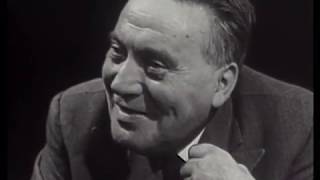
Jean Hyppolite (1907-1968) was a French philosopher best known for championing the work of Georg Wilhelm Friedrich Hegel and other German philosophers, and educating some of France’s most prominent post-war thinkers. Deleuze studied Hegel under him at the Lycée Henri-IV where, Deleuze later recalled, Hyppolite “rhythmically beat out Hegelian triads with his fist, hanging his words on the beats” (Dialogues, 12). Hyppolite’s major works include Genesis and Structure of Hegel’s Phenomenology of Spirit (1947) and Logic and Existence (1953).
Hyppolite graduated from the École Normale Supérieure (ENS) in 1924, in the same class as Jean-Paul Sartre. After graduation he embarked on a serious study of Hegel, teaching himself German in order to read the Phenomenology of Spirit in the original. In 1939 he came out with his own translation and his commentary would later form the basis of the book Genesis and Structure. After the Second World War, Hyppolite became a professor at the University of Strasbourg, before moving to the Sorbonne in 1949. In 1952, Hyppolite published Logique et existence, a work that correlates Hegel’s Phenomenology to his Logics (longer and shorter), and raised questions of language, being, and difference that were to become the hallmarks of French philosophy at the end of the 20th century. Deleuze wrote an important review of the book that is included in Desert Islands and Other Texts, 1953-1954.
In 1954, he became the director of the ENS, where Jacques Derrida, Gérard Granel and Étienne Balibar were among his students. In 1955, he produced a study of Karl Marx’s earlier, more Hegelian period, at a time when the French interest in Hegel was at its apogee. In 1963, he was elected to the Collège de France and given a chair in The History of Philosophical Thought. He was teh successor to Martial Guerout and predecessor to Michel Foucault in this post.
In 1965, Hyppolite was interviewed for television by Alain Badiou, then only 28 years old, as part of a series of interviews with French philosophers that included Michel Foucault, Georges Canguilhem, Raymond Aron, Paul Ricoeur, Michel Henry and Michel Serres. The interview can be viewed on the BNF’s Gallica page (here), and the transcripts of all the interviews were eventually published in a volume edited by Tzuchien Tho and Giuseppe Bianco, Badiou and the Philosophers: Interrogating 1960s French Philosophy.
While philosophers such as Jean-Paul Sartre were known for producing new works influenced by German philosophy, Hyppolite was remembered primarily as an expositor, teacher, and translator. He died in Paris in October 1968, a few months after the May 68 protests.